More Good Video Choices Coming Out on More Devices

I didn’t really think I’d ever say it, but I don’t miss my old TV, the one that has their shows set at the time the channels’ decided you wanted to watch them because it meets their advertisers’ needs.
But it’s done.
It wasn’t painful when we trimmed our cable and went OTT (over the top) with our smart 4K set.
After all, a little reality – Big Brother; Survival; Kardasians; Duck Dynasty; Real House Wives of New Jersey, Houston, Beverly Hills – goes a long way.
Even though we highly dislike the cable guy, we kept him around a little because it’s the biggest pipe in town right now and great for streaming HD and 4K content to our Nuvola box.
Instead of being happy about it, my kids decided they didn’t like my show selections so they did what to them is natural … switched to their iPads, iPhones/Galaxies and chose their own entertainment.
According to BI Intelligence, they aren’t alone.
YouTube is racking up one billion unique visitors a month watching over six billion hours of video a month.
I guess Schmidt and the boys at Google saw that cat videos could mature into something really huge!
Sure, live TV ads still dwarf digital video ads. According to Luma, TV revenue rose to $150 billion, while digital revenue rose to $8 billion, making the trend hard to ignore.
New Producers
And with the super inexpensive Blackmagic 4K cameras, Adobe cloud, Mac Pro and a bunch of OWC Thunderbolt storage units, a growing number of young folks are becoming film and series producers.
If you want to see what tomorrow’s TV is going to look like, check out your kids or you neighbor’s kids.
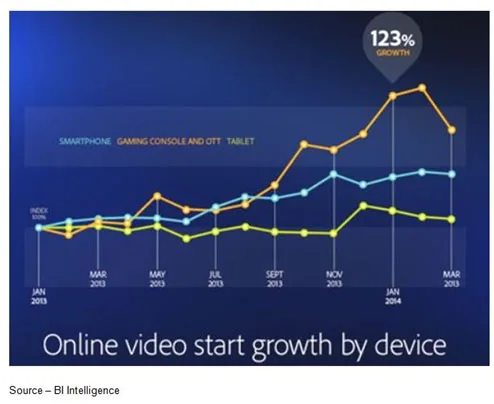 Different View – The growing dependence as the go-to for everything device is rapidly becoming the entertainment/news video solution of choice for people of all ages.
Different View – The growing dependence as the go-to for everything device is rapidly becoming the entertainment/news video solution of choice for people of all ages.
Viewing by Gen Zers, the connected generation, has dropped seven percent in the past five years, according to Nielsen.
They’re ignoring the big screen in the family room and taking to their smartphones/tablets.
It turns out they watch less “TV” than any other age group and they’re showing the older generations that there are better options … lots of them.
According to ComScore:
– 34 percent watch more online video than TV
– On average, they’ll watch 500 videos a month choosing from 75 B
– They’ll spend three hours less a month sitting in front of a TV
– They lead more than 60M Americans who have found “a better way”
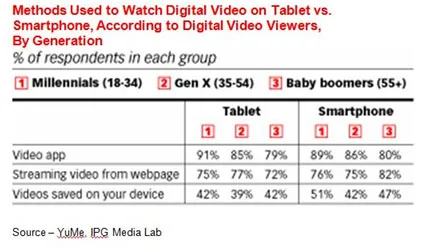 Roving Eyes – Despite age differences, mobile viewing on a smartphone or tablet varies very little by group. It is almost as though people are saying they use whatever device they have in their hands at the time.
Roving Eyes – Despite age differences, mobile viewing on a smartphone or tablet varies very little by group. It is almost as though people are saying they use whatever device they have in their hands at the time.
If you spend any amount of time searching at all, you’ll find that there are hundreds of years of video out there with Vine, YouTube, Instagram, Yahoo, AOL, HuffPost and dozens of other fledgling channels Internet channels around the globe.
The new studios/channels tell the new producers/actors exactly what Bob Hauk said, “We’d make one hell of a team.”
The newbies not only agree but a lot of it is really good; and globally, the choices increase more than 72 hours every minute.
According to Strategy Analytics, video accounted for 2.8 EB of data last year and will grow to 8.6EB by 2017.
Tradition Challenged
Much of it is coming from the new online studios/channels.
That has the networks and cable bundlers wondering how they’re going to fit into the entertainment picture of tomorrow.
After all, these kids are going to grow up and will be the big spenders (advertising targets) of tomorrow.
The chances of them waking up suddenly one morning and discovering they’re “responsible adults” and going back to grandpa’s TV habits are slim to none!
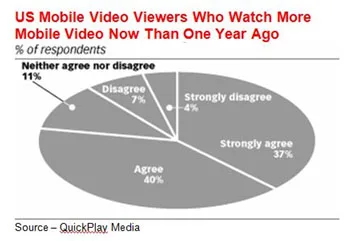 MoBetta – By an overwhelming margin, people – young and old – agree that they are watching more content on their mobile devices. It’s a trend that is almost impossible to change.
MoBetta – By an overwhelming margin, people – young and old – agree that they are watching more content on their mobile devices. It’s a trend that is almost impossible to change.
Movie and TV stars aren’t taking any chances because they read Variety and see the articles that say kids identify more with YouTube and online celebs than them so they’ve begun cranking up their own online streaming video content.
Their entourage is building their audiences with Facebook, Twitter and other online promotional activities … and it’s working.
Suddenly, the new generation is discovering them!
As Bob Hauk noted, “You know how to get in quiet.”
The great thing for the new film/series makers and more established producers/stars is that the kids readily share information, news and segments.
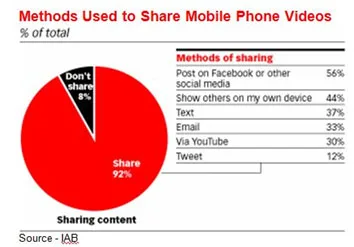 Shareable – When people see a video or show that they like, they enjoy sharing the information with friends, family and others. Hollywood and show producers have mastered the art of spreading the word-of-mouth promotional activities with Tweets and social media.
Shareable – When people see a video or show that they like, they enjoy sharing the information with friends, family and others. Hollywood and show producers have mastered the art of spreading the word-of-mouth promotional activities with Tweets and social media.
When they see something that interests them or that they enjoy, they share the information and link with friends.
A Little Behind
While my kids like to think they’re among the elite few who have found walk-around digital video, they’re far from alone.
In fact, it turns out they’re a little behind.
Snake explained it by saying, “Not now, I’m too tired.”
The trend to streaming content – TV shows, movies, short videos, branded content, adventure/athletic events and yes, even cat videos – is global.
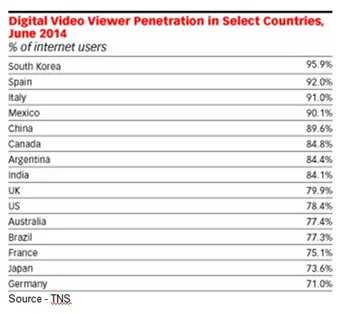 Digital Entertainment – Video entertainment viewing isn’t limited to any one country. It is growing worldwide at the expense of analog and scheduled time/location viewing.
Digital Entertainment – Video entertainment viewing isn’t limited to any one country. It is growing worldwide at the expense of analog and scheduled time/location viewing.
In fact, South Koreans lead the trend.
Online viewers in many countries outstrip the IP (internet protocol) viewing in countries with highly developed Internet economies like the U.K. and U.S. But then, they also aren’t burdened with a built-out and well-connected (financially) cable industry that is determined to maintain its revenue streams.
Digital video viewing – watching what they want when they want it – is gaining momentum and there isn’t anything the cable bundlers and network packagers can do to slow the trend.
eMarketer estimates that in the U.S., 77.3 percent of internet users watch digital video at least once per month (195.6M viewers) and the level of online activity will grow more than 50 percent per annum.
Well, there are a few things that could slow the inevitable transition to online and OTT viewing … bandwidth.
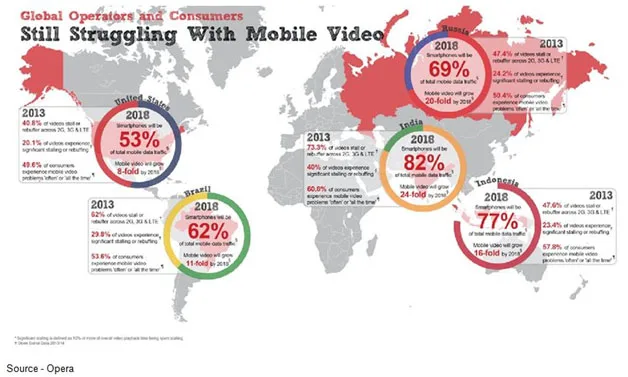 Bandwidth Struggle – Around the globe, wireless bandwidth service providers are struggling to keep up with wireless bandwidth user demand.
Bandwidth Struggle – Around the globe, wireless bandwidth service providers are struggling to keep up with wireless bandwidth user demand.
Today, there are more than eight billion devices connected to the Internet including M2M, tablets, notebooks, feature/smartphones and other portable devices that operate on WiFi, 2G, 3G and increasingly, LTE (long term evolution) technologies.
Money Talks
The challenge for carriers is to ride the wave of popularity, upgrade their networks and turn network usage into profits.
And, of course we consumers want it to be a disposable commodity to drive the prices down.
The carriers are at a crossroads.
They need to spend money for LTE and network upgrades but they can no longer charge what the traffic will bear because commodity WiFi is pretty good and getting better.
They all share the same spectrum; and video data sucks up a lot of the bandwidth, which may be fine with you as long as you get your digital video; but it’s hell when keeping you entertained interferes with business … especially at work.
That’s one of the reasons most OTT and mobile video services (and SMPTE – Society of Motion Picture and Television Engineers and others) are pushing as hard as possible for the worldwide adoption of HEVC (high efficiency video coding) or h.265.
It doubles the compression compared to most of the stuff shown today – MPEG-4 – and improves the video quality at the same bit rate.
And looking ahead, it will support 8K UHD (yes, you’ll be able to buy a new set/mobile device in a few years) with resolutions up to 8192 x4320 (really sharp stuff).
Oh yes, they’re also talking behind closed doors and lobbying their governments’ communications czars to take some of the spectrum from the cable guy and give it to the telephone guy so they can stream more stuff.
After all, everyone wants to entertain you.
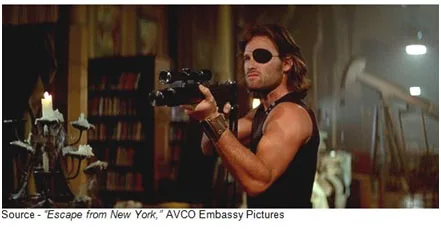 Of course, after you’ve racked up all those entertainment minutes on your smarphone/tablet, you’ll understand why
Of course, after you’ve racked up all those entertainment minutes on your smarphone/tablet, you’ll understand why
Snake was a little sarcastic when he said, “Yeah, you and everybody else!”
But as comScore reported, with the dearth of mobile apps available, the majority of digital media consumed today is on mobile devices.
Viewing on smarphones is up to 88 percent, compared to 82 percent on tablets.
True Gen Zers have better eyes than I do, but the kids asked when I was going to really put my phablet to use and I agreed with Snake, “I’m thinking about it.”
# # #